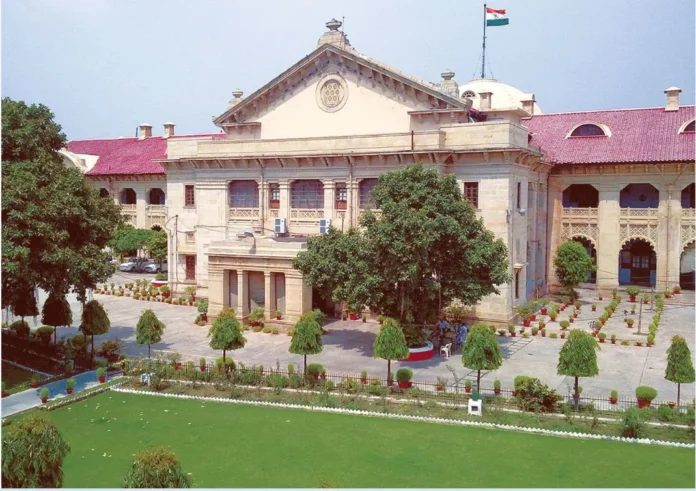The Allahabad High Court while rejecting a transfer application said that the transfer applications concerning cases pending in Family Courts which fall within the territorial jurisdiction of the Lucknow Bench of the High Court must be filed before the Lucknow Bench itself, not the principal seat at Allahabad.
A Single Bench of Justice Kshitij Shailendra passed this order while hearing a transfer application filed by Smt Shivika Upadhayay.
The Prayer to transfer Case under Section 13(1)(a) of Hindu Marriage Act, 1955 from Principal Judge, Family Court, Lucknow to District Bareilly has been made in the application.
The Stamp Reporting Section has submitted a report regarding non-maintainability of the transfer application on the ground that the case is pending under the territorial jurisdiction of the Lucknow Bench.
Counsel for the applicant submitted that since part of cause of action has arisen within the territorial limits of jurisdiction of the Court, i.e the Principal seat, the transfer application is maintainable as it is the choice of the applicant to choose forum.
Many applications seeking transfer of proceedings pending in family courts functioning in territorial limits of jurisdiction of Lucknow Bench are coming up for consideration at the Principal seat and in almost all cases, plea of “arising of part of cause of action” within territorial limits of Principal seat at Allahabad is taken. In this view of the matter, this Court deems it appropriate to deal with this issue in some details.
The Court observed that whatever arguments are advanced either taking a plea of “part of cause of action” or “forum convenience”, the same are based upon certain authorities which have dealt with the issue of territorial jurisdiction in relation to writ petitions filed under Article 226 of the Constitution of India. This is so because sub-clause (2) of Article 226 of the Constitution provides that power conferred by clause (1) of the said article to issue directions, orders or writs may also be exercised by any High Court exercising jurisdiction in relation to the territories within which the cause of action, wholly or in part, arises for the exercise of such power.
The Court said that the authorities deal with territorial limits of jurisdiction of a writ court under Article 226 of the Constitution of India and as regards Allahabad High Court, provisions of UP High Courts (Amalgamation) Order 1948 have been dealt with along with concept of Forum Convenience and arising of cause of action, wholly or in part.
However, in order to examine as to whether in matrimonial matters, when transfer is sought on the basis of convenience of the parties or other like grounds such as place of temporary or permanent residence of one of the parties or pendency of certain cases in one or the other districts, provisions of Code of Civil Procedure, 1908 read with Family Courts Act, 1984 must be dealt with, otherwise the confusion regarding territorial jurisdiction in such matters would continue to prevail, the Court further said.
The Court further observed that,
Words “Appellate Court” used in Section 23(1) of CPC are of much significance. While advancing arguments based upon Forum Convenience or arising of cause of action in transfer matters, it is always urged that since there is a single High Court in the State of UP, all the Family Courts are subordinate to the High Court and, hence, transfer application can be filed either before the Principal Seat of this Court or its Lucknow Bench. However, sub-section (1) of Section 23 makes it clear that subordination of courts in the matters of transfer has to be understood in the light of “Appellate Court”.
On perusal of the provisions of the Act of 1984, it is clear that establishment of a Family Court is as per notification issued by the State Government defining the local limits of the area to which the jurisdiction of a Family Court shall extend. Further, Family Court shall be deemed to a District Court and in view of Section 2(4) of the Code of Civil Procedure, a District Court would confine its jurisdiction as per its local limits and not beyond that. Hence, territories to which any Family Court exercises its jurisdiction would determine the Forum where application seeking transfer of proceedings pending in such areas would lie.
“It is found in Sections 22 to 25 of the Code and those provisions are exhaustive in nature. Whereas Sections 22, 24 and 25 deal with power of transfer, Section 23 merely provides forum and specifies the court in which an application for transfer may be made. Section 23 is not a substantive provision vesting power in a particular court to order transfer. It has further been held that where several courts having jurisdiction are subordinate to one appellate court, an application for transfer may be made to such appellate court and the court may transfer a case from one court subordinate to it to another court subordinate to it.
In view of the above discussion of sections 2(4), 3, 22, 23, 24 CPC read with Section 2(d), 2(e) and 7 of the Family Courts Act, the Court is of the considered view that since Lucknow Bench would be the appellate court competent to hear the appeals against an order passed by Family Court situated in any of the courts subordinate to it and functional within its/ their territorial limits of jurisdiction, the transfer application in relation to a case pending within those territories shall lie before the Lucknow Bench being the appellate court and not before the principal seat at Allahabad where such an appeal would be incompetent,” the Court also observed while rejecting the application.


